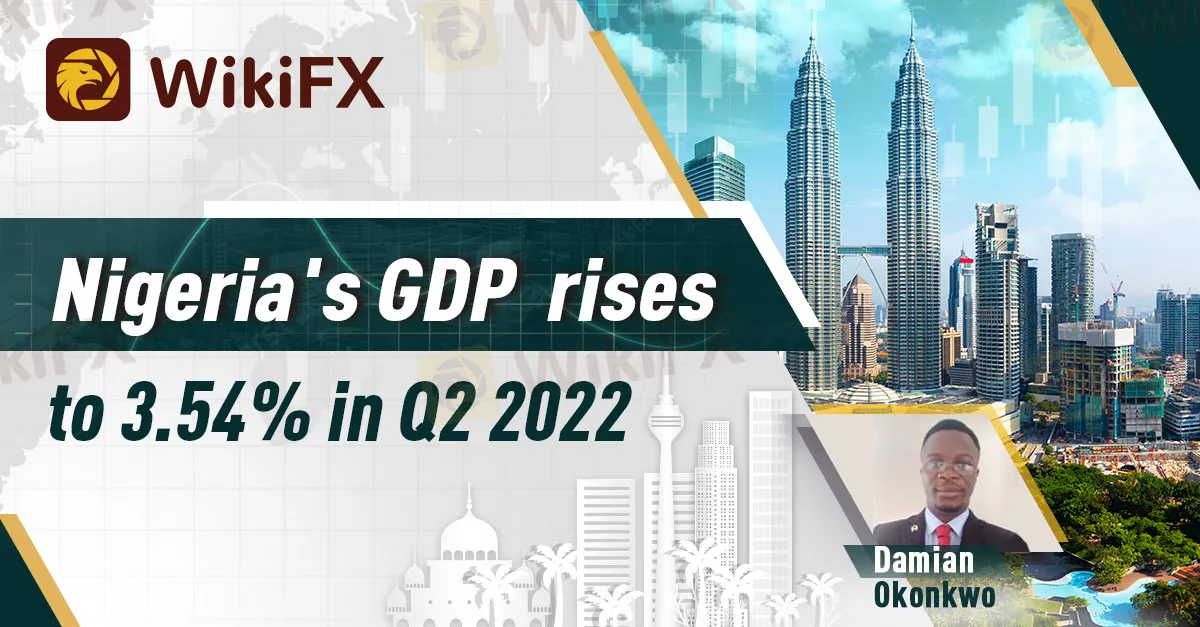简体中文
繁體中文
English
Pусский
日本語
ภาษาไทย
Tiếng Việt
Bahasa Indonesia
Español
हिन्दी
Filippiiniläinen
Français
Deutsch
Português
Türkçe
한국어
العربية
Nigeria's GDP rises to 3.54% in Q2 2022
Abstract:Nigeria has witnessed a decline in the annual growth rate of its Gross Domestic Product (GDP) in Q2, 2022. With its GDP for the just concluded Q2 2022 rising to 3.54 percent Year-over-Year marking a significant 1.47 percent decline when compared to 5.01 percent witnessed in Q2 2021. However, with regards to Q1 2022, the real GDP seen in Q2 2022 could be said to have improved by 0.44 percent Quarter-over- Quarter when compared to the 3.11 percent recorded in Q1 2022.

By: Damian Okonkwo

Nigeria has witnessed a decline in the annual growth rate of its Gross Domestic Product (GDP) in Q2, 2022 amidst the present economic crisis. According to the report released last week's Friday by the National Bureau of Statistics (NBS), the GDP for the just concluded second quarter in 2022 grew by 3.54 percent Year-over-Year marking a significant 1.47 percent decline when compared to 5.01 percent witnessed in Q2 2021.
However, with regards to Q1 2022, the real GDP seen in Q2 2022 could be said to have improved by 0.44 percent Quarter-over-Quarter when compared to the 3.11 percent recorded in Q1 2022.
More details of the report released by the NBS showed that the major growth in the GDP came from the Agricultural sector which recorded a total of 23.24% growth in its aggregate GDP marking a 0.88% improvement from the previous record of 22.36% seen in Q1 2022.
Nevertheless, the aggregate GDP stood at N17.29 trillion in the second quarter of 2022, marking an over -0.37% decline compared to the N17.35 trillion witnessed in Q1 2022.
An in-depth study of this data showed that the major growth came from the Agricultural sector which rose to 23.24% as the aggregate GDP; compared to the previous record of 22.36% seen in Q1 2022. This marks 1.2% growth year-on-year coming from the agricultural sector.
Similarly, the Services sector rose by 6.7%, while the Industrial sector decreased by 2.3%. This marks another round of decline compared to the 6.81% decline recorded in Q1, 2022.
More so, the oil sector further declined by 11.77% YoY in Q2 2022 compared to the previous record of 26.04% witnessed in Q1 2022. Here the oil sector could be said to have contributed a total of 6.33% to the real GDP in Q2 2022 compared to the previous record of 7.42% in Q2, 2021.
The non-oil sector increased by 4.77 percent in Q2 2022 marking a 1.97 percent decline compared to its previous record in Q2 2021.
The growth in the non-oil sector was largely driven by ICT, Trade, Financial Institutions Agriculture, Transportation, and Manufacturing companies.
Conclusion
The overall implication of the readings from the GDP data above showed that the Nigerian economy performed a little better compared to its previous performance in the first quarter of 2022, but has declined so much when compared to its growth rate compared to its performance in the second quarter of 2021.

Disclaimer:
The views in this article only represent the author's personal views, and do not constitute investment advice on this platform. This platform does not guarantee the accuracy, completeness and timeliness of the information in the article, and will not be liable for any loss caused by the use of or reliance on the information in the article.
Read more

Bank Negara Malaysia Flags 12 New Companies for Unauthorised Activity
Bank Negara Malaysia (BNM) has updated its Financial Consumer Alert List (FCA List) by adding 12 more entities, reinforcing its efforts to warn the public against unregulated financial schemes. Check if your broker made the list!

TradingView Brings Live Market Charts to Telegram Users with New Mini App
TradingView has launched a mini app on Telegram, making it easier for users to track market trends, check price movements, and share charts.

March Oil Production Declines: How Is the Market Reacting?
Oil production cuts in March are reshaping the market. Traders are closely watching OPEC+ decisions and supply disruptions, which could impact prices and future production strategies.

How to Calculate Leverage and Margin in the Forex Market
Leverage amplifies both potential profits and risks. Understanding how to calculate leverage and margin helps traders manage risks and avoid forced liquidation.
WikiFX Broker
Latest News
Exposing the Top 5 Scam Brokers of March 2025: A Closer Look by WikiFX
Gold Prices Climb Again – Have Investors Seized the Opportunity?
Webull Launches SMSF Investment Platform with Zero Fees
Australian Regulator Warns of Money Laundering and Fraud Risks in Crypto ATMs
The Withdrawal Trap: How Scam Brokers Lure Victims into Paying More
FCA to Investors: Think Twice Before Trusting These Brokers
Trump\s tariffs: How could they affect the UK and your money
Trump gambles it all on global tariffs he\s wanted for decades
TradingView Brings Live Market Charts to Telegram Users with New Mini App
HTFX Spreads Joy During Eid Charity Event in Jakarta
Currency Calculator







